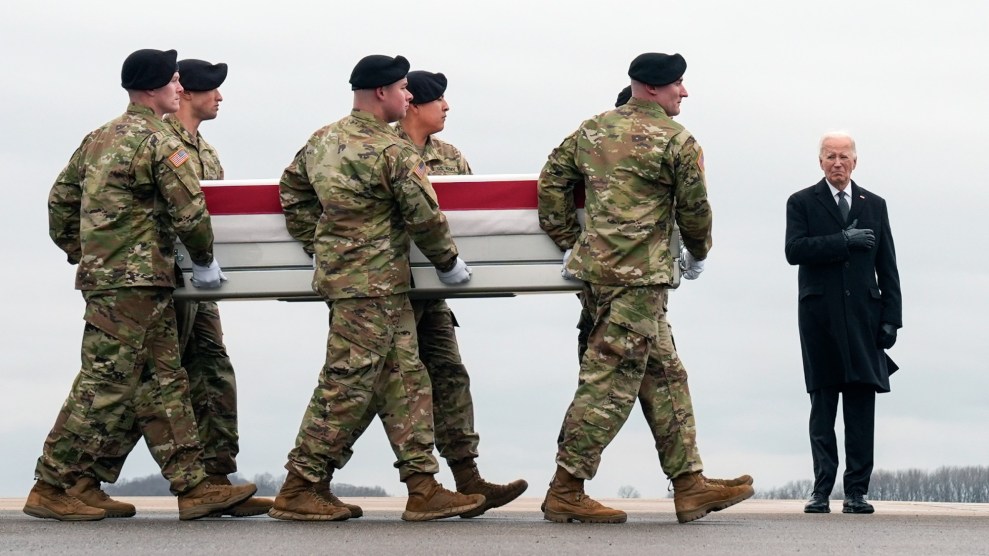
Army carry team moves the transfer case containing the remains of service member killed in a drone attack in Jordan.Matt Rourke/AP
On Friday, the United States launched retaliatory airstrikes in Iraq and Syria against targets linked to Iran’s Islamic Revolutionary Guards Corps and Iranian-backed militant groups. The strikes have reportedly killed nearly 40 people, with more military operations expected to follow amidst growing tension in the Middle East and fears of a wider regional conflict. “The United States does not seek conflict in the Middle East or anywhere else in the world,” President Joe Biden said in a statement about the airstrikes. “But let all those who might seek to do us harm know this: If you harm an American, we will respond.”
Here’s what we know so far:
Why did the US attack Iranian military targets?
The Friday airstrikes were conducted in response to a January 28 drone attack on US troops that killed three American soldiers and wounded dozens of others at a military outpost in Jordan. The US Department of Defense identified the service members as Sgt. William Jerome Rivers of Carrollton, Georgia; Spc. Kennedy Ladon Sanders of Waycross, Georgia; and Spc. Breonna Alexsondria Moffett of Savannah, Georgia. The drone attack marked the first fatal assault by Iran-backed militias against US troops since the start of the Israel-Hamas war. This round of airstrikes follow US operations against Iran-aligned militant groups and an estimated 150 attacks by proxy forces against US bases in Iraq and Syria since October. Iran denied involvement in the drone attacks but a coalition of Iranian-backed militias known as the Islamic Resistance in Iraq claimed responsibility.
What was the result of the US airstrikes?
Eighty-five targets at seven locations in western Iraq and eastern Syria have been hit by the strikes, according to the US Central Command, including command and control headquarters, intelligence centers, rockets and missiles, drone and ammunition storage sites, and other facilities. “There’s been no communications with Iran since the attack,” National Security Council spokesperson John Kirby told reporters on Friday night. At least 23 pro-Iran militants have been killed in eastern Syria, according to the Syrian Observatory for Human Rights.
What has Iran done in response and what are other countries saying?
Iran’s Foreign Ministry condemned the airstrikes in Iraq and Syria, calling them “violations of the sovereignty and territorial integrity” of those countries. “The attack last night on Syria and Iraq is an adventurous action and another strategic mistake by the American government which will have no result other than increasing tensions and destabilizing the region,” said Nasser Kanaani, a spokesman for Iran’s Foreign Ministry. Prior to the attack, Iranian President Ebrahim Raisi had said the country would “not start any war, but if anyone wants to bully us they will receive a strong response”; afterward, Yahya Rasool, a spokesperson for the Iraqi army, said the strikes “constitute a violation of Iraqi sovereignty and undermine the efforts of the Iraqi government, posing a threat that will pull Iraq and the region to undesirable consequences.” Notably, Iran has refrained from threatening to retaliate.














